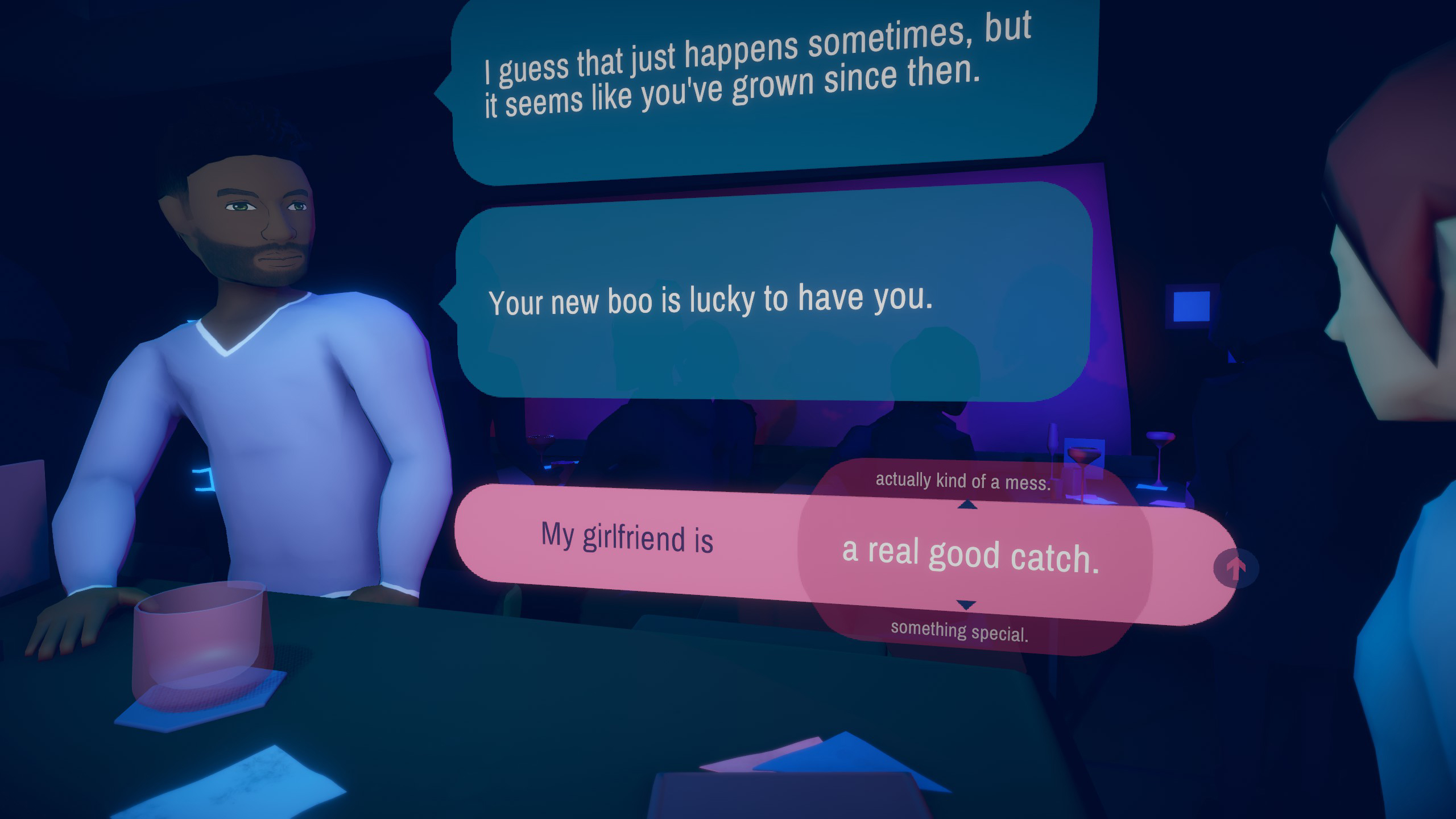This indie game has a brilliant modular dialogue system
Instead of picking from a list of responses, cycle through different parts of a sentence to build one in We Should Talk.

"We should talk" isn't a sentence anyone wants to hear. Ever. The talk is never gonna be someone revealing they just bought you a puppy and some cotton candy. It's going to be about feelings, problems, conflicts, or the fact that they appreciate all your hard work but unfortunately they have no choice but to lay you off.
The indie game We Should Talk (on Steam and Itch) has a number of conversations that involve feelings, problems, and conflicts. The character you play is visiting a bar where you can talk to a flirty bartender, an ex-boyfriend, and a thirsty stranger all while your current partner repeatedly texts you from home. Lots of conversations, and plenty of uncomfortable situations.
The manner in which you participate in these conversations is really interesting, and it's a system I really hope more games will copy in the future. Rather than picking from a selection of responses, you pick from a selection of sentence fragments to build the response you want. It's a modular sentence system, and it's brilliant.
For instance, when my partner texts with a gentle accusation that I "like being around all the drunk cuties" at the bar, I can scroll through the options of three different sentence fragments that will form my response. The first three options are "You shouldn't be," "Are you always," and "I'm not." The second set of options are "obsessing over," "worried about," and "thinking about." The third: "cuties," "what I'm doing," and "my nights out."
From that I can build responses like "Are you always thinking about what I'm doing?" or "You shouldn't be obsessing over my nights out," or "I'm not thinking about cuties" or any other combination of those fragments.
Sometimes these responses represent overtly dramatic choices—like when you're deciding to blame your ex for your break-up as opposed to chalking it up to drifting apart. That will have a big impact on a conversation, such as ending it entirely.
But what's neat is how the modular sentence system allows for some real nuance in your responses—the difference between telling someone not to worry about something and not to "obsess" about something is pretty biting, the difference between reassurance and defensiveness. Telling someone not to do something and accusing them of "always" doing something has an entirely different tone. By cycling through the fragments you can craft a sentence that ranges from concerned to understanding to hostile.
Keep up to date with the most important stories and the best deals, as picked by the PC Gamer team.
Not all of the sentences you build wind up wildly different—sometimes they essentially all mean the same thing, they just carry a different tone. But tone is so important. Telling someone "Jeez, guy, you're not funny," and "Jeez, guy, fuck off," result in the same event, the guy hitting on you giving up.
But the choice between gently brushing someone off and slamming the figurative door in their face is a distinct one, and helps you develop the character you're playing. It lets you put a more personal stamp on a line, even if the path isn't one that branches.
It's neat! I'd love to see RPGs and other games with dialogue use a similar systems—putting together your own sentences makes you feel like you're participating in conversations in a way that just choosing between a few pre-made options doesn't.
We Should Talk isn't a long game—you can make it through in about fifteen minutes or so, but it's meant to be replayed, with nine different endings as you choose different sentences to see how those choices play out.

Chris started playing PC games in the 1980s, started writing about them in the early 2000s, and (finally) started getting paid to write about them in the late 2000s. Following a few years as a regular freelancer, PC Gamer hired him in 2014, probably so he'd stop emailing them asking for more work. Chris has a love-hate relationship with survival games and an unhealthy fascination with the inner lives of NPCs. He's also a fan of offbeat simulation games, mods, and ignoring storylines in RPGs so he can make up his own.

